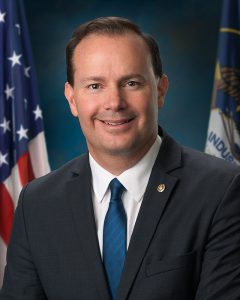Twelve Republican Senators Vote With Democrats!
Mark Levin is one of the premier authorities, if not THE premier authority, on the United States Constitution in the country today. I am a constitutional purist, and so is he, so we have a great deal in common. Certainly, though, I do not agree with him on everything. His support of a constitutional convention, or, as he prefers to call it, an Article V convention of states, is a case in point. However, it is not the constitutional issue upon which we disagree but on the wisdom of doing it.
So I was very eager to hear what Mark had to say about the recent Senate vote to terminate Trump’s Declaration of Emergency, in general, and about the twelve renegade Republicans who voted with the entire Democrat caucus to terminate it, in particular, but most especially, about Senators Rand Paul and Mike Lee, who many of us had heretofore considered members of the tiny congressional “Good Guy” caucus. I wasn’t disappointed. In his radio show of March 13, Levin took the flail of logic, reason, and incomparable knowledge and laid the renegades’ collective backs bare. In the end, the miniscule “Good Guy” caucus, which can hardly afford any more reductions to its number, had to strike yet two more names from its roster – those of Senators Rand Paul and Mike Lee. There are 535 members of Congress, and it is a pitiful fact that the membership roster of this virtual caucus can be kept on one side of a small index card. So, when I hear the party say, “Elect more Republicans!”, I say, “Yeah, right.”
So why do Paul and Lee say that they voted against the president?
Both senators have  issued terse statements on the subject, and you can find them if you want, but the gist is that they say that the president is exercising powers not granted to him under the Constitution. According to Lee, the bigger surprise of the two, “That’s not governing. That’s ruling.” At the time of the Kavanaugh appointment, I hadn’t understood why Trump had passed over Lee for Kavanaugh. Now, maybe I do.
issued terse statements on the subject, and you can find them if you want, but the gist is that they say that the president is exercising powers not granted to him under the Constitution. According to Lee, the bigger surprise of the two, “That’s not governing. That’s ruling.” At the time of the Kavanaugh appointment, I hadn’t understood why Trump had passed over Lee for Kavanaugh. Now, maybe I do.
As I said, in his show of March 13, Levin gave us another great tutorial on the Constitution, using most of the first 25 minutes of the Audio Rewind podcast, which has few, if any, commercials. At the end of this article, I will include a timeline of points that Levin made, along with a link to the podcast episode so that you can listen for yourself, but here are a couple:
00:03:35 National Emergencies Act of 1976. Has specific authorities. Congress can still overrule him. Still subject to judicial review.
This act gives the president the authority to declare a national emergency along with  certain powers when he does. As we have just seen, however, Congress still has the power to overrule him, and, if his opponents can muster 67 votes in the Senate to override his veto, that will be done. His declaration is also subject to judicial review, so to say that acting under the authority that you have given him is dictatorial is arrogant, hypocritical, constitutionally ignorant. and simply beyond absurd. Do they think we are stupid? Yeah, I know, but we aren’t, are we?
certain powers when he does. As we have just seen, however, Congress still has the power to overrule him, and, if his opponents can muster 67 votes in the Senate to override his veto, that will be done. His declaration is also subject to judicial review, so to say that acting under the authority that you have given him is dictatorial is arrogant, hypocritical, constitutionally ignorant. and simply beyond absurd. Do they think we are stupid? Yeah, I know, but we aren’t, are we?
00:04:03 Military Construction Codification Act of 1982. Specifically recognizes the power of the president to reallocate funds for military construction projects when he declares a national emergency.
This act clarifies and codifies that the president, upon declaring a national emergency, has the power to move already appropriated funds around accordingly.
If these two acts are unconstitutional, then the proper thing to do would be to repeal them, not to nip at the heels of a president who properly uses powers that you gave him to do the job that rightly belongs to you but which you absolutely refuse to do. Has either Paul or Lee ever called for the repeal of these acts? I doubt it. If these laws are unconstitutional and to act under them is dictatorial, then many past presidents have been dictators. What have Paul and Lee said about that?
It turns out that both Senators Rand Paul and Mike Lee had each drafted a compromise bill, but the president said, in effect, “No, you had your chance and did nothing. Neither of these bills will pass, either, and wouldn’t do the job if they did, so I am going to declare a national emergency to get done what you did not do and what you, even today, still will not do.” So, like petulant little children who were told that they couldn’t have their candy, they threw a tantrum and voted against the president for stated reasons that they cannot possibly sell to any thinking and knowledgeable person, and, thankfully, we have accomplished constitutional scholars like Mark Levin to teach us about these things.
So it seems to me, Senators Paul and Lee, that the conversation that we need to have should be less about the president overdoing his job in trying to do your job for you and more about your not doing the job that you were elected to do. Wouldn’t you agree? No, I suppose you wouldn’t.

[spacer height=”20px”]
Timeline
00:03:15 – Trump most constitutional president since Reagan.
00:03:35 – National Emergencies Act of 1976. Has specific authorities. Congress can still overrule him. Still subject to judicial review.
00:04:03 – Military Construction Codification Act of 1982. Specifically recognizes the power of the president to reallocate funds for military construction projects when he declares a national emergency.
00:04:29 – Sometimes we forget that the president IS the Executive Branch.
00:05:30 – “MCCA 1982 violates the non-delegation doctrine”. No it doesn’t. How so? NDC only applies to rules of private conduct. What does violate the separation of powers is when Obama wrote legislation on his own, called DACA, without any other statutory basis or authority.
00:06:35 – If NEA 1976 is unconstitutional, then multiple presidents have violated the Constitution, and Congress [including every feckless, ineffective, hot-air-filled member of this and every other Congress since] has done nothing about it. If the movement of funds under the MCCA 1982 is unconstitutional, a dictatorial act, then past presidents have been dictators.
[Any of these 7 renegade Senators ever talk about that? Ever?]
00:07:10 – The fact of the matter is that this [movement of funds from agencies] is far more acceptable as a constitutional matter than the existence of the agencies in the first place.
00:07:25 – These people aren’t constitutional purists; they’re fools.
00:08:20 – The Second Amendment, etc. Doesn’t give the president the power to change the Constitution.
Levin Podcast of 3/13/19 (opens in a new tab)
Jere Moore has been blogging about political matters since 2008. His posts include commentary about current news items, conservative opinion pieces, satirical articles, stories that illustrate conservative principles, and posts about history, rights, and economics.
